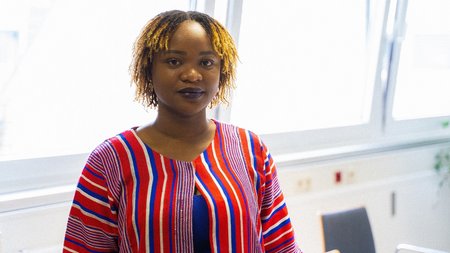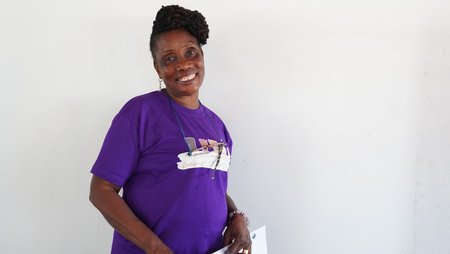medica Liberia: “We’re driving change.”

Yah and Elizabeth, you have been working in Liberia for many years to strengthen women’s rights. A study has been done which shows how your work is having an impact. How do you explain your influence?
Yah Parwon: During Liberia’s 14-year civil war, a significant number of women and children were subjected to sexualised violence. While the conflict was raging, little was done to prevent sexualised violence or directly support survivors in Liberia. After the war, we initiated direct contact with survivors of sexualised violence and have since built up an extensive network for collaboration. Unfortunately, despite the civil war having ended two decades ago, women and children continue to be affected by violence and the availability of support services remains limited.
How important is trust for your work?
Yah Parwon: Shaping and consolidating structures in the communities where we work – this is important and can only be done by gaining the trust of the people. This has the most influence on our work locally. Without trust, no one will take up our offers. So we work with the municipalities and work together to achieve communities free of violence.
Elizabeth Greene: Our approach is holistic. That is very important for us. It is essential to adopt a trauma-sensitive approach and to empower survivors. Survivors of sexualised violence can come to us and take advantage of our practical services. Or they can come and simply talk to us about the structures in which we live. That can help, too. The needs and wishes of the survivors come first.

What makes medica Liberia’s work so special?
Yah Parwon: Our holistic, trauma-sensitive approach. We work to prevent sexualised violence and look at why it occurs in the first place. In this world of violence and crisis, our goal is to address the root causes of violence, while also ensuring that survivors have access to all the care and support they need. We work on the supposedly small things in the communities. And we also work on broader issues at national level with other organisations.
Elizabeth Greene: We are happy to be able to offer a range of services, including legal counselling and psychosocial support. That is what makes us unique in Liberia.
Studies and reports are often cited by so-called ‘backlash’ movements, or groups putting up resistance to change. They might highlight improvements or an apparent decrease in the number of cases of sexualised violence being reported to downplay the issue. Do you come across this in your work as well?
Yah Parwon: These observations are difficult to categorise. There is indeed a study that shows there were initially a lot of reports of sexualised violence and then later there were fewer. But the question is: What is being measured? Social change is happening and the response from communities is audible. A big part of our work has been, and continues to be, talking about visibility and attention to sexualised violence in communities, making sure survivors know where to go and what to do if they have experienced violence.
Our experience is that it takes time to build up enough trust to talk about the issue and report cases. This long-term work is important: a community needs to be engaged to fight sexualised violence. But it takes time: We talk to people and listen to them. And, most importantly: Women need to be empowered to raise their voices against sexualised violence. It’s a rollercoaster ride. Even at the national level, it goes back and forth. We have to ensure there is no rolling back of laws on, for example, abortion: this would be to the detriment of women.

Elizabeth Greene: It’s also about cultural beliefs – it takes time to convince people of different views. When we started with medica Liberia, we only worked with women. Then we realised we had to change our concept in order to reach all the people in the communities. In our new project, we work with women and men equally. Men need to hear about the consequences of sexualised violence for themselves – and the alternatives.
What gives you both hope?
Elizabeth Greene: The implementation of our services. Working as part of our team. Giving women hope. When I see women coming to us and telling us their story, opening up – that they then receive support from us and come out stronger. I can see that strength, and it makes me proud.
Yah Parwon: Working with communities gives me hope. We are driving change and can see it happening. Working on it with a variety of groups.


